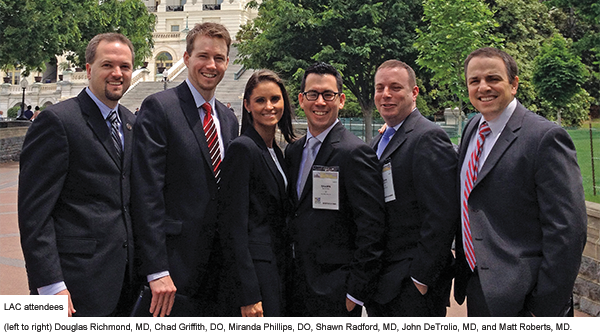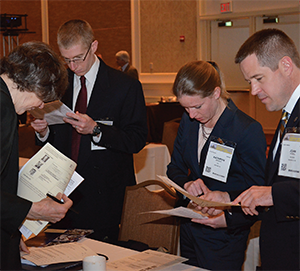
Nearly 550 attendees at Leadership and Advocacy Conference (LAC) this year explored major issues of health care reform implementation that impact the emergency medicine. In addition to getting up to speed on the issues, practicing physicians, residents, and medical students also learned how to be more effective advocates for our patients, our specialty, and the public. The highlight of the meeting is always ACEP Lobby Day, when conference attendees descend on Capitol Hill to discuss our issues and concerns with congressional leaders. The bills discussed by ACEP during our visits to the Hill this year propose real solutions to real problems that we face every day in caring for patients in the ED. This year’s key issues were psychiatric patient boarding, the lack of resources for mental health care, the lack of funding for graduate medication education, and the need for liability protection for EMTALA care provided in the ED.
Explore This Issue
ACEP Now: Vol 33 – No 07 – July 2014
Before meeting with Members of Congress and their staffs, emergency physicians from Delaware prepare their message and organize their visit schedules.
This conference may seem quite intimidating to those who don’t consider themselves political experts. You might think that the conference is really only for the “club” of political geeks who have been attending since the conference first started back in the 1990s. It’s natural to feel that a member of Congress will recognize inexperience and eat you alive in a discussion about health care policy. Well, you would be completely wrong.
This conference is designed for everyone, from the political novice to the crustiest political wonk in the specialty. Perhaps that is the best thing about it. Beyond the issues, data, and charts, politics is really about building relationships. The strength of LAC is that it brings together residents, students, and young physicians who are new to the game and full of new ideas and incredible energy with others who are more seasoned in the specialty in order to network and learn from one another.
During the first two days, there are great presentations about current health care policy issues and building leadership skills. In addition to focusing on national-level policies and health care reform, we must realize that each of us is a leader every time we don our stethoscopes and pick up a chart. The leadership development sessions and experiences are designed to nurture skills and techniques that can be used at the chapter and national levels of ACEP–and help you in your professional and private life.
Highlights of this year’s lectures included a very informative and entertaining opening presentation titled “The Gift of Leadership” by Mark Levin, BAI, Inc. president, and a luncheon talk by Patrick Conway, MD, MSc, who is the deputy administrator for innovation and quality and chief medical officer at the Centers for Medicare & Medicaid Services. Dr. Conway highlighted the challenges and opportunities of creating new paradigms for the delivery and financing of health care as our population grows and ages.
In addition to the educational programs, there are great social events including opportunities to network with emergency physician leaders from throughout the country at the Opening Reception and the Congressional Reception. This year, ACEP’s National Emergency Medicine Political Action Committee (NEMPAC), had a reception for VIP donors at the United States Botanic Garden just outside the Capitol. NEMPAC and the Emergency Medicine Physicians Political Action Committee (EMP PAC) cohosted fund-raisers for two emergency physicians in Congress, Rep. Joe Heck (R-NV) and Rep. Raul Ruiz (D-CA).

The high point of the conference is the visit to Capitol Hill. The opportunity to have your voice heard by your elected officials is one of the most exciting things an emergency physician can ever experience, especially for the first-timers. Physicians are grouped by state and by district. The afternoon is spent in a small group with colleagues from your state, traveling from office to office to meet with the US representative from your home district and with your US senators.

Congressmen and ACEP members Dr. Raul Ruiz (D-CA; left image, on right) and Dr. Joe Heck (R-NV; above right) talk with ACEP members during fundraisers held for them
by NEMPAC and EMP PAC at LAC.
During the Capitol Hill visits, you meet with staffers and, in most cases, the members of Congress themselves. In a congressional office, staffers work closely with the elected official and do a great deal of the grunt work in developing and reviewing the myriad health care–related bills introduced each year. During a congressional office visit, you have roughly 30 minutes to discuss what bills you deem most important and why you would like your member of Congress to support them. As a physician, constituent, and American citizen, this may be the most important meeting you can have. This is more important than voting because you actually talk to the people who can effect change.
Members of Congress and staffers don’t have firsthand knowledge of what affects our patients every day; they depend on our opinions to influence their positions on bills. Being emergency physicians gives us a unique perspective on medicine and society. We have “street cred,” and no one else understands health care better than we do. Staffers and members of Congress will listen intently to what you have to say and sometimes challenge your positions while you get to challenge theirs. Although you might not agree on all issues, it is the best opportunity to educate them about the critical role that emergency medicine plays in the US health care system.
Dr. Dierks is an emergency physician at Genesis Medical Center in Davenport, Iowa.
Dr. Cirillo is director of health policy and legislative advocacy for Emergency Medicine Physicians in Canton, Ohio.
Pages: 1 2 3 | Multi-Page




No Responses to “ACEP 2014 Leadership and Advocacy Conference Highlights”